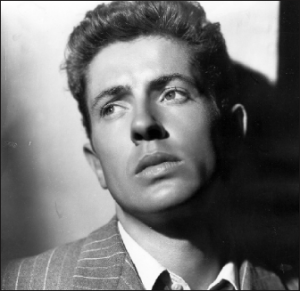By Mike Wilmington Wilmington@moviecitynews.com
Wilmington On… Farley Granger (1925-2011)
 There aren’t many major ‘40s-‘50s film noir actors left, but Farley Granger was one. Granger, who died at 85 on Sunday, March 27, was the darkly handsome, disturbingly sensitive-looking lead in four indisputable noir classics, Nicholas Ray’s They Live by Night (1949), Anthony Mann’s Side Street (1950), and Alfred Hitchcock’s Strangers on a Train (1951) and Rope (1948).
There aren’t many major ‘40s-‘50s film noir actors left, but Farley Granger was one. Granger, who died at 85 on Sunday, March 27, was the darkly handsome, disturbingly sensitive-looking lead in four indisputable noir classics, Nicholas Ray’s They Live by Night (1949), Anthony Mann’s Side Street (1950), and Alfred Hitchcock’s Strangers on a Train (1951) and Rope (1948).
Blessed (or sometimes cursed) with porcelain pretty boy looks, dark curly hair and an expression that could vary from bruised innocence and outright anguish to wary bemusement and dissolute sadism, Granger became a Hollywood movie star at 18, right out of North Hollywood High, when Samuel Goldwyn decided to sign him and groom him. He was cast as juveniles in two Lewis Milestone WWII war movies, North Star (1943) and The Purple Heart (1944), and Goldwyn picked him up again when Granger returned from actual World War II service in 1948.
He was sensitive, and/or troubled, in most of his most famous parts, including the four above, and he became a familiar Hollywood movie figure, until 1955, when he signed off for a while with another minor noir, Maxwell Shane’s The Naked Street and with the Richard Fleischer true crime period drama, The Girl in the Red Velvet Swing. From then on, Granger returned far less often to the big screen, though — thanks to his classic noirs, and to the 1952 Goldwyn musical Hans Christian Andersen with Danny Kaye — he remained a permanent part of the Hollywood movie landscape.
And of the international film landscape as well. One of His finest performances was as the handsome, seductive and amoral Austrian Army officer, Lt. Franz Mahler, the wastrel who ruins Alida Valli‘s life, in Luchino Visconti‘s great operatic Italian period drama Senso — a role that Marlon Bando had wanted and read for. (Senso has just been released in a splendid Criterion edition, complete with a documentary, interviews, and a bonus disc of the film‘s complete English language version, The Wanton Contessa, with Granger’s voice.)
It’s his noirs though that make Farley Granger a movie immortal. We remember him best as the murderous but conscious-plagued college boy modeled on Chicago thrill-killer Nathan Leopold, in Rope; as the desperate young husband caught in a web of crime in Side Street; as the romantic young bank-robbing outlaw, Bowie, part of a classic Bonnie-and-Clyde team with Cathy O’Donnell‘s Keechie in They Live By Night (Granger and O’Donnell, who also costarred with him in Side Street, make up one of the movies‘ classic beautiful-young-noir-couples-in-peril); and as socially ambitious star tennis player Guy Haines, bedeviled by the persistent “criss-cross” killer, Bruno Anthony (played by the magnificently deranged Robert Walker), in Hitchcock’s masterpiece Strangers on a Train.
Thanks to those four film noirs, and Senso, he’ll never fade from our screens.
Granger may have suffered in ‘50s Hollywood, a time and place where his bisexuality — something more than hinted at in his roles in both Rope and Strangers — could be something of a career killer. (Among his lovers: Rope’s writer Arthur Laurents, composer-conductor Leonard Bernstein, Shelley Winters and Ava Gardner.) He also may have suffered from the fact that he unhesitatingly accepted the film role with Visconti, an aristocrat/ Communist known as the “Red Count,” during the late Red Scare era.
But Granger didn’t seem to have let the ups and downs of an actor’s life overly bother him. I interviewed him several years ago, along with his longtime companion/collaborator Robert Calhoun (co-author of Granger’s 2007 autobiography “Include Me Out“), and he was a gracious, witty, gentlemanly and congenial tale-spinner, taller than you‘d think (6‘1”), full of stories. And, in his 80s, Farley Granger still had perfect features for black-and-white photography, a face born for noir.













